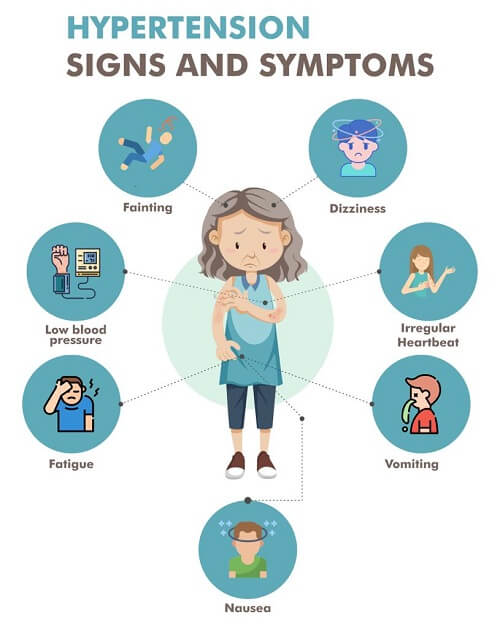Low Blood Pressure SymptomsA top (systolic) blood pressure of fewer than 90 millimetres of mercury or bottom (diastolic) blood pressure of less than 60 mm Hg is generally considered low. When blood pressure is significantly lower than expected, people suffer from hypotension or low blood pressure. It can be a unilateral ailment or a symptom of a variety of other disorders. It may not exhibit symptoms, but if it does, it may require medical attention. Another individual could be fine with what other people consider to be low blood pressure. Low blood pressure can go unobserved, or it can cause fainting and tiredness. A low level of blood pressure can be fatal on rare days. Dehydration, severe medical disorders, and other factors contribute to low blood pressure. Types of Low Blood PressureTypes of low blood pressure include: Low orthostatic pressure (postural hypotension)- Blood pressure drops dramatically when rising from sitting down or lying in the bed position. Some of the causes are dehydration, prolonged bed rest, pregnancy, certain illnesses, and certain drugs. Regarding a meal, hypotension develops- This drop in blood pressure occurs one to two hours after eating. Older people are more vulnerable, especially if they have high blood pressure or autonomic nervous system disorders like Parkinson's. Symptoms may be lessened by consuming more water, eating small, low-carb meals, and abstaining from alcohol. Hypotension is caused by neural activity- Following extended durations of standing, the decline in blood pressure occurs. Young people and kids are most commonly impacted by low blood pressure. It could be the outcome of a heart and brain communication problem. Orthostatic hypotension and multiple system atrophy- The neurological system, which regulates involuntary processes such as digestion, respiration, blood pressure, and pulse rate, is affected by this uncommon condition, also known as Shy-Drager syndrome. It is generally linked to experiencing high blood pressure while lying down. How does it affect the body?In most cases, your body can automatically regulate your blood pressure and prevent it from falling too low. If it begins to fall, your body tries to compensate for it by either quickening your heartbeat or narrowing your blood vessels. Hypotension symptoms occur when your body cannot adjust enough to counter the drop in blood pressure. Hypotension frequently goes unnoticed by its sufferers. If their blood pressure isn't tested, many people aren't even aware that they have low blood pressure. The repercussions for those experiencing symptoms depend on what is causing the hypotension, why it is occurring, how quickly it develops, and what is generating it. Hypotension is more prevalent as people age because slow drops in blood pressure are typical. Frequent drops in blood pressure may indicate that some areas of the body aren't getting enough blood flow. That could have inconvenient, distracting, or even fatal impacts. Major Symptoms of Low Blood PressureSome signs of low blood pressure (hypotension) are:
Whenever a person's blood pressure drops suddenly or is accompanied by symptoms, it may indicate an underlying medical problem. 
The risks of experiencing a sudden drop in blood pressure. Diaphoresis and fainting can occur with a 20 mm Hg change in systolic blood pressure, such as going from 110 to 90 mm Hg. Significant drops in blood pressure, such as those resulting from uncontrolled bleeding, bacterial illnesses, or adverse reactions, can be life-threatening. Shock is a condition caused by hazardously low blood pressure. There are several shock symptoms:
When to consult a Doctor/PhysicianConsult an emergency department if patients exhibit shock or low blood pressure (hypotension). Most medical professionals consider blood pressure to be too low only when it causes symptoms. Multiple factors, such as excessive sunlight exposure or continuous use of bad baths, may cause temporary dizziness or light-headedness on occasion. It is critical to consult with a doctor or nurse for an official diagnosis. If you are experiencing low blood pressure readings on a regular basis but are otherwise healthy, the doctor may want to monitor you while performing routine medical examinations. It can be useful to keep track on the symptoms, happenings, and activities.
Next TopicBasal Ganglia Anatomy
|
 For Videos Join Our Youtube Channel: Join Now
For Videos Join Our Youtube Channel: Join Now
Feedback
- Send your Feedback to [email protected]
Help Others, Please Share









